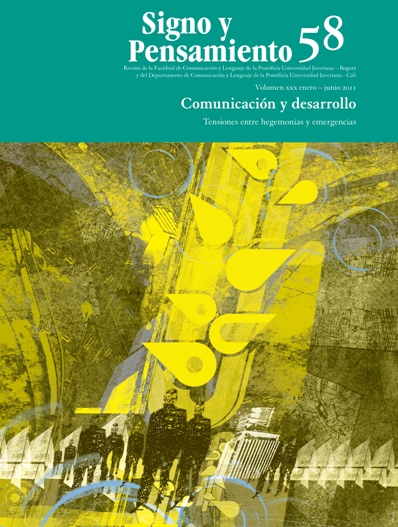Abstract
Herein we present some features of the epistemological crises in the educational field, behind the notions of development and communication for development; we also outline some emerging outlooks for each of those features. Thus, in this paper, we share some significant experiences in community communication from Pontificia Universidad Javeriana (Cali campus) as initiatives that attempt to redeploy the value of different knowledge fields, of intercultural education, of new ways of arranging economic and social life beyond development, as well as the value of invigorating and making visible such transformation proposals. Origen
— (2009), Desarrollo y posdesarrollo: modelos y alternativas, Cali, Universidad del Valle.
Cendales, L. y Torres, A. (2006), “La sistematización como experiencia investigativa y formativa”, La Piragua, núm. 23, pp. 35-36.
Escobar, A. (2010a), “El posdesarrollo como concepto y práctica social” [en línea], disponible en: http://www.unc.edu/~aescobar/ text/esp/El%20postdesarrollo%20como%20 concepto.pdf, recuperado: 29 de septiembre de 2010.
— (2010b), “Una minga para el posdesarrollo” [en línea], disponible en: http://www.unc. edu/~aescobar/text/esp/escobar.2010.UnaMinga.pdf, recuperado: 15 de octubre de 2010.
Gumucio, A. (2009, 26 de febrero), entrevistado por Franco, F.; Marión, M., y Pérez, G., Cali.
Gutiérrez, F. y Prieto, D. (1996), Mediación pedagógica, Guatemala, Universidad de San Carlos.
Herrera, A. y Uruburu, S. (2010), “La relación entre comunicación y desarrollo en Colombia. El aporte de la investigación de las facultades de comunicación entre 2000 y 2006”, Signo y Pensamiento, núm. 56, pp. 209-243.
Mallart, J. (2000), “Didáctica: concepto, objeto y finalidades”, en Sepúlveda, F. y Rajadell, N., Didáctica general para psicólogos, uned.
Max Neef, M. (2002), Desarrollo sin sentido. Colombia, Diseñadores del futuro.
Morin, E. (2001), La cabeza bien puesta. Repensar la reforma. Reformar el pensamiento, Buenos Aires, Ediciones Nueva Visión.
Muñoz, M. (2008), “Retos a la educación superior en el centro y sur de América desde el diálogo entre ciencia y conocimiento ancestral”, en La educación superior en el mundo: nuevos retos y roles emergentes para el desarrollo humano y social, Barcelona, Global University Network for Innovation guni, Mundi-Prensa.
Sousa Santos, B. de (2009), Una epistemología del sur: la reinvención del conocimiento y la emancipación social, México, clacso Siglo xxi.
Vasco Uribe, C. E. (2010), “Tres tesis sobre la educación universitaria en la segunda década del siglo xxi”, Signo y Pensamiento, núm. 56, pp. 209-243.
This journal is registered under a Creative Commons Attribution 4.0 International Public License. Thus, this work may be reproduced, distributed, and publicly shared in digital format, as long as the names of the authors and Pontificia Universidad Javeriana are acknowledged. Others are allowed to quote, adapt, transform, auto-archive, republish, and create based on this material, for any purpose (even commercial ones), provided the authorship is duly acknowledged, a link to the original work is provided, and it is specified if changes have been made. Pontificia Universidad Javeriana does not hold the rights of published works and the authors are solely responsible for the contents of their works; they keep the moral, intellectual, privacy, and publicity rights.
Approving the intervention of the work (review, copy-editing, translation, layout) and the following outreach, are granted through an use license and not through an assignment of rights. This means the journal and Pontificia Universidad Javeriana cannot be held responsible for any ethical malpractice by the authors. As a consequence of the protection granted by the use license, the journal is not required to publish recantations or modify information already published, unless the errata stems from the editorial management process. Publishing contents in this journal does not generate royalties for contributors.


